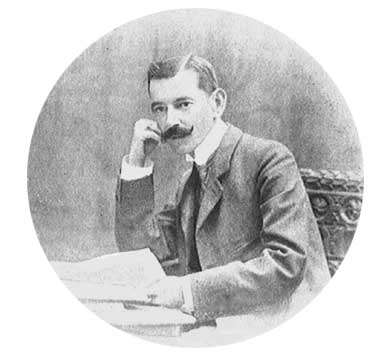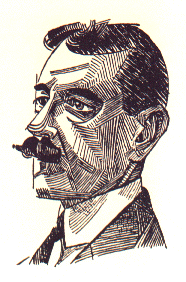<Back to Index>
- Mathematician John Hadley, 1682
- Architect Jules Hardouin Mansart, 1646
- Puerto Rican Independence Activist José de Diego y Martínez, 1866
PAGE SPONSOR


José de Diego y Martínez (April 16, 1866 – July 16, 1918), known as "The Father of the Puerto Rican Independence Movement", was a statesman, journalist, poet, and advocate for Puerto Rico's independence from Spain and from the United States.
De Diego, son of Felipe de Diego Parajón, a Spanish army officer from Asturias, Spain, and Elisa Martínez Muñiz, a Criollo from Puerto Rico, was born in Aguadilla, Puerto Rico, and received his primary education in Mayagüez, Puerto Rico. He then moved to Spain where he graduated from the "Polytechnic College of Logroño". While in Spain, de Diego collaborated with the newspaper El Progreso (Progress) which was founded by José Julián Acosta and which attacked the political situation in Puerto Rico. This led to various arrests and eventually he returned to the island.
In 1886, de Diego had an unhappy love affair, with Carmen Echavarría, which led him to write one of his acclaimed poems "A Laura" (To Laura). This poem became very popular among the romantics of that time. He became known as the "Father" of the "Modern Puerto Rican Poetry Movement". Among his most noted poetry books are: Pomarrosas, Jovillos, Cantos de Rebeldía and Cantos del Pitirre.
De Diego returned to Spain and studied law in Barcelona. He received his law degree and continued his studies until he graduated with a doctorate in law in 1892. He then returned to Puerto Rico to advocate for its autonomy from Spain. De Diego set up his law practice in Arecibo and was the founder of the newspaper La República (The Republic). Together with Román Baldorioty de Castro, Diego founded the "Autonomist Party" in 1887. Luis Muñoz Rivera and Rosendo Matienzo Cintrón, who were members of the party, formed a committee which ultimately convinced the Spanish representative in the island Práxedes Mateo Sagasta to support the idea of autonomy for Puerto Rico. De Diego did not accompany Muñoz Rivera and Matienzo Cintrón, because he believed that Spain should be a Federal Republic and Mateo Sagasta's party followed the ideals of the monarchy. De Diego envisioned the establishment of a Confederation of the Spanish speaking islands in the Caribbean which would include Dominican Republic and Cuba, known as the Antillean Confederation. In 1897, Spain acknowledged Puerto Rico's autonomy, after Mateo Sagasta's victory in Spain. De Diego celebrated Muñoz Rivera's accomplishment and was named Sub-Secretary of Justice and Government. Puerto Rico's autonomy, however was short-lived.After the United States invasion of Puerto Rico during the Spanish - American War, the Treaty of Paris (1898) committed Spain to ceding Puerto Rico to the United States as a war bounty.
On June 5, 1900, President William McKinley named de Diego, together with Rosendo Matienzo Cintrón, José Celso Barbosa, Manuel Camuñas, and Andrés Crosas to an Executive Cabinet under U.S. appointed Governor Charles H. Allen. The Executive Cabinet also included six American members. De Diego resigned from the position in order to pursue the island's right to govern itself. In 1904, he co-founded the "Unionist Party" along with Luis Muñoz Rivera, Eduardo Georgetti, Rosendo Matienzo Cintrón and Antonio R. Barceló.
De Diego was then elected to the House of Delegates, the only locally elected body of government allowed by the U.S., and which De Diego presided from 1904 to 1917. The House of Delegates was subject to the U.S. President's veto power and voted for the island's right to independence and self-government and against the imposition of U.S. citizenship to Puerto Ricans, among other resolutions passed. None of these requests were honored by newly developing US hemispheric expansionism. In 1914, Barceló, Muñoz Rivera and de Diego were members of an executive council that attempted to form an alliance between the Union and Republican Parties. In 1917, after Luis Muñoz Rivera died, Barceló became the leading force behind the liberal ideas of the island. Barceló and De Diego were against the creation of the Jones - Shafroth Act which would impose United States citizenship upon the citizens of Puerto Rico because the act represented an impediment to Puerto Rican independence as a final status solution and because the judicial and executive branches would still be controlled by the United States. The Jones - Shafroth Act, however was approved by the United States and signed into law by President Woodrow Wilson on March 2, 1917. The Union Party under Barceló's leadership then resolved to adopt a different stance and to seek more autonomy which he believed would finally lead to independence. This move prompted de Diego's, who was a strong independence advocate, to have great differences with the majority of his party members,. De Diego became known as the "Father of the Puerto Rican Independence Movement".
He founded the "Colegio de Agricultura y Artes Mecánicas de Mayagüez" now known as "University of Puerto Rico at Mayagüez". De Diego travelled throughout the Caribbean and Spain seeking the support from what he called "Los hermanos de la misma raza" (Brothers of the same race) for Puerto Rico's independence. After giving a speech in Barcelona expressing such a request, he became known as the "Caballero de la Raza" (The gentlemen of the race). José de Diego's right leg developed gangrene and was amputated in 1916. He died in New York City on July 16, 1918 of endocarditis. His remains were returned to Puerto Rico and are buried in the "Cementerio Antiguo de San Juan" (Old San Juan Cemetery), in San Juan, Puerto Rico.
José de Diego's memory has been honored in Puerto Rico, by having his birth date as an official holiday as well as the naming schools, avenues, and a highway after him. The plaza in his hometown of Mayagüez, the Plaza José de Diego is named in his honor, plus there are schools in Chicago, Illinois, Brooklyn, New York, and Miami, Florida named after him.